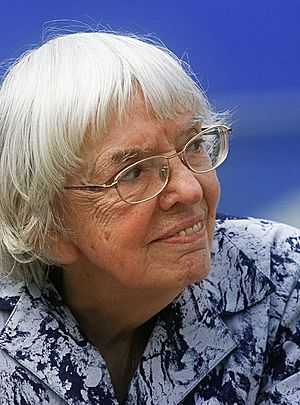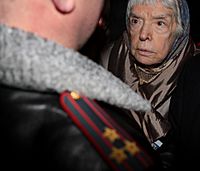Lyudmila Alexeyeva facts for kids
Quick facts for kids
Lyudmila Alexeyeva
|
|
|---|---|
| Людмила Михайловна Алексеева | |

Alexeyeva in 2005
|
|
| Born |
Lyudmila Mikhaylovna Alexeyeva
20 July 1927 Yevpatoria, Crimean ASSR, Russian SFSR, Soviet Union
|
| Died | 8 December 2018 (aged 91) |
| Nationality | Russian |
| Citizenship | Soviet Union (1927–1977) United States (1982–2018) Russia (1991–2018) |
| Alma mater | the MSU Faculty of History, the graduate school of the Moscow State University of Economics, Statistics, and Informatics |
| Occupation | Russian historian, activist, chairwomen of the Moscow Helsinki Watch Group |
| Known for | Human rights activism with participation in the Moscow Helsinki Group |
| Movement | Moscow Helsinki Group, Strategy-31, other rights-related movements |
| Spouse(s) | Nikolay Williams |
| Awards | State Prize of the Russian Federation, Order of Merit of the Federal Republic of Germany, Olof Palme Prize, Légion d'honneur, Order of the Lithuanian Grand Duke Gediminas, Order of the Cross of Terra Mariana, Sakharov Prize |
Lyudmila Alexeyeva (born July 20, 1927 – died December 8, 2018) was a famous Russian historian and activist. She worked hard to protect human rights in Russia. In 1976, she helped start the Moscow Helsinki Watch Group. She was one of the last Soviet dissidents, meaning she spoke out against the government in the Soviet Union. She continued her work in Russia after the Soviet Union ended.
Contents
Lyudmila Alexeyeva's Life and Work
Early Activism in the Soviet Union
In April 1968, Lyudmila Alexeyeva was removed from the Communist Party. She also lost her job at a publishing company. But this did not stop her from fighting for human rights.
From 1968 to 1972, she secretly worked as a typist. She helped create an underground newspaper called The Chronicle of Current Events. This newspaper reported on human rights problems in the Soviet Union.
Moving to the United States
In February 1977, Lyudmila Alexeyeva had to leave the Soviet Union. This happened because the government was cracking down on people involved with The Chronicle. She moved to the United States.
In the US, she kept working for human rights in Russia. She wrote for radio stations like Radio Free Europe/Radio Liberty and Voice of America. In 1982, she became a US citizen.
She wrote many articles about the people who spoke out against the Soviet government. In 1985, she published a book called Soviet Dissent. This book was about the history of this movement. She also wrote her autobiography, The Thaw Generation, in 1990.
Returning to Russia and Continued Work
In 1989, Lyudmila Alexeyeva helped restart the Moscow Helsinki Group. This group works to protect human rights. It had stopped its work in 1982.
After the Soviet Union broke apart in 1991, she returned to Russia in 1993. In 1996, she became the leader of the Moscow Helsinki Group.
In 2000, she joined a group that advised President Vladimir Putin on human rights. Some other activists did not agree with this decision.
Speaking Out Against the Government
Lyudmila Alexeyeva often criticized the Russian government's actions. She said they violated human rights. She pointed out that the government often stopped peaceful protests. She also said they encouraged extreme nationalist ideas.
For example, she criticized the mass deportations of people from Georgia in 2006. She also spoke out against police actions targeting foreigners. She warned that growing violence in some areas could spread across Russia.
In 2006, the Russian government accused her of working with British intelligence. She also received threats from nationalist groups.
Protesting for Freedom of Assembly
From August 2009, Lyudmila Alexeyeva actively joined "Strategy-31" protests. These were regular rallies held in Moscow. People protested to protect Article 31 of the Russian Constitution. This article protects the right to gather peacefully.
On December 31, 2009, she was arrested by police during one of these protests. Many others were also detained. This event caused strong reactions both in Russia and other countries. Leaders from the European Parliament and the United States expressed their concern. The New York Times even wrote a front-page story about her.
On March 30, 2010, she was attacked by a man at a metro station. This happened while she was honoring victims of a bombing. A youth group called Nashi even called her "a Nazi" and an enemy of Russia.
Lyudmila Alexeyeva did not agree with Russia taking over her home region of Crimea in 2014. She said it "shamed my country." On her 90th birthday, President Vladimir Putin visited her at home. This was despite her long history of criticizing him.
She passed away in a Moscow hospital on December 8, 2018. She had written her last public words to celebrate the 70th anniversary of the Universal Declaration of Human Rights. She worried about how propaganda was weakening society. She also noted problems with legal systems and democracy in Russia and other countries.
Awards and Recognition
Lyudmila Alexeyeva received many awards for her human rights work:
- 2004 — Olof Palme Prize
- 2005 — Person of the Year Prize from Jewish Communities of Russia
- 2007 — The French Legion of Honour
- 2009 — The Order of Merit of the Federal Republic of Germany
- 2009 — Sakharov Prize for Freedom of Thought
- 2012 — The Order of the Cross of Terra Mariana, 3rd class
- 2015 — The Václav Havel Human Rights Prize
- 2017 — State Prize of the Russian Federation
See also
 In Spanish: Liudmila Alekséyeva para niños
In Spanish: Liudmila Alekséyeva para niños
 | William L. Dawson |
 | W. E. B. Du Bois |
 | Harry Belafonte |


